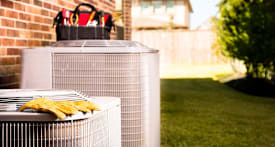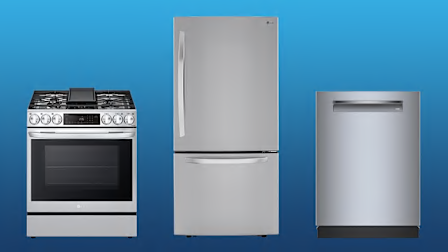Best Energy-Efficient Kitchen Appliances
These top-rated refrigerators, dishwashers, ranges, and small appliances can help reduce your carbon footprint
When you shop through retailer links on our site, we may earn affiliate commissions. 100% of the fees we collect are used to support our nonprofit mission. Learn more.

If it’s been 15 years or more since you upgraded what’s in your kitchen—think refrigerators, dishwashers, ranges, and countertop appliances—now might be the time. Even without considering all the new features and conveniences of the latest appliances, experts suggest that upgrading can be good for the planet.
- Best Energy-Efficient: Refrigerators Dishwashers Ranges Countertop Appliances
CR's Guide to Home Improvement
Find top-rated products and expert tips to help you save energy and money—and protect your home from extreme weather.
Best Energy-Efficient Refrigerators
Your fridge is one of the largest sources of your home’s electricity consumption, and the largest source in your kitchen. According to the U.S. Department of Energy, an old refrigerator uses about 35 percent more energy than an Energy Star certified model.
We’ve found top-freezer and bottom-freezer models are generally more energy-efficient than side-by-side and French-door models. Models with through-the-door ice and water dispensers typically cost more and use more energy than models without those features.
Best Energy-Efficient Dishwashers
Today’s dishwashers use about half the water and energy that models used 20 years ago—down to about 3 to 5 gallons per load. A standard-sized Energy Star certified dishwasher costs about $50 a year to run, per Energy Star, and can save about 5,800 gallons of water over its lifetime.
Many dishwashers in CR’s ratings earn a top score for energy efficiency, but the very best energy-efficient dishwashers also earn top scores for washing and drying performance.
Best Energy-Efficient Ranges
According to Energy Star, induction ranges are a good way to improve your kitchen’s energy efficiency—they’re also routinely the top performers in our range tests. Using electromagnetic technology, these stovetops use about 15 percent less power than electric coil options. The elements also heat up water faster than even the most powerful electric and gas stoves. (The oven on an induction range works the same as the oven in an electric coil or smoothtop range.)
If you’re not quite ready for an induction stove, a newer electric smoothtop or coil range is still better for the environment than a gas range, which loses lots of heat while in use and releases fumes that contribute significantly to indoor air pollution.
As for the oven, opt for one with convection, a fan setting that typically uses 20 percent less energy than a standard oven. Self-cleaning models are also a bit better when it comes to heat loss because they tend to be better insulated.
Best Energy-Efficient Countertop Appliances
Countertop appliance technology has become so advanced that some models can do just about everything an oven or a stovetop can do, just on a smaller scale and with half the wattage. For most people, they’re often the kitchen appliances that use the least energy. We’re talking about air fryers, microwaves, multi-cookers, slow cookers, and toaster ovens.
When it’s speed you’re after, a microwave can heat up food in minutes using up to 80 percent less energy than an electric range or oven. Generally speaking, a small microwave, rated at 600-800 watts, is more energy-efficient than a larger one. An air-frying toaster oven has the added bonus of getting foods very crispy in less time than an oven. Simmering a stew in a slow cooker or multi-cooker for hours will also draw much less energy than a stovetop or oven.
If you’re interested in upgrading or adding a countertop appliance to your kitchen, check out the best air fryers, microwaves, multi-cookers, slow cookers, and toaster ovens from CR’s tests.




















